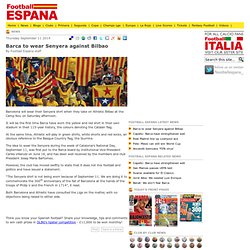

Barcelona to wear ‘senyera’ kit at Camp Nou against Athletic Club Bilbao « Inside Spanish Football. Barcelona and Athletic Club Bilbao have both agreed to wear their away kits in Saturday’s La Liga encounter, with the home side set to sport their ‘senyera’ colours at the Camp Nou, for the first time in the club’s history for a home game.
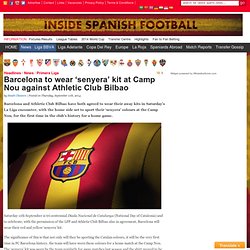
National Day of Catalonia. A giant seafood Paella, being cooked on the National Day of Catalonia 2003 in the village square of Cornudella de Montsant.
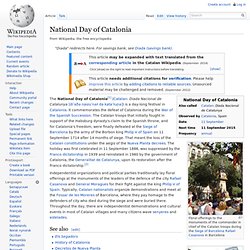
Independentist organizations and political parties traditionally lay floral offerings at the monuments of the leaders of the defence of the city Rafael Casanova and General Moragues for their fight against the king Philip V of Spain. Typically, Catalan nationalists organize demonstrations and meet at the Fossar de les Moreres of Barcelona, where they pay homage to the defenders of city who died during the siege and were buried there. Throughout the day, there are independentist demonstrations and cultural events in most of Catalan villages and many citizens wave senyeres and estelades. See also[edit] External links[edit] Catalan independence. Supporters of Catalan independence in 2012 "L'Estelada Vermella" (The Red Starred Flag), the red version of the pro-independence flag.
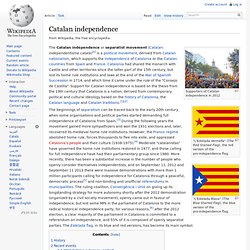
Statute of Autonomy of Catalonia. The Statute of Autonomy of Catalonia provides Catalonia's basic institutional regulations under the Spanish Constitution of 1978.
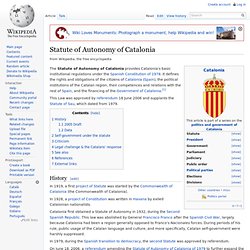
It defines the rights and obligations of the citizens of Catalonia (Spain), the political institutions of the Catalan region, their competences and relations with the rest of Spain, and the financing of the Government of Catalonia.[1] This Law was approved by referendum 18 June 2006 and supplants the Statute of Sau, which dated from 1979. History[edit] Catalonia profile - Overview. 14 August 2013Last updated at 12:43 ET Proud of its own identity and language, Catalonia is Spain's richest and most highly industrialised region, and also one of the most independent-minded.
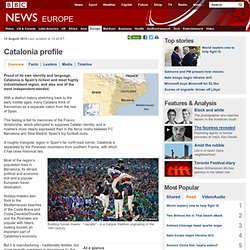
With a distinct history stretching back to the early middle ages, many Catalans think of themselves as a separate nation from the rest of Spain. This feeling is fed by memories of the Franco dictatorship, which attempted to suppress Catalan identity, and is nowhere more clearly expressed than in the fierce rivalry between FC Barcelona and Real Madrid, Spain's top football clubs.
A roughly triangular region in Spain's far north-east corner, Catalonia is separated by the Pyrenean mountains from southern France, with which it has close historical ties. Building human towers - "castells" - is a Catalan tradition originating in the 18th century Most of the region's population lives in Barcelona, its vibrant political and economic hub and a popular European travel destination.
Barcelona to drop home kit for Catalan colours against Athletic Bilbao. Barcelona are set to drop their home kit on Saturday, a move which has delighted followers of the Catalonia independence movement.
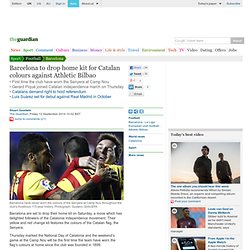
Barcelona to drop home kit for Catalan colours against Athletic Bilbao. Left-Wing Soccer – Understanding the Political Divide in Cypriot Football. This article focuses on the political situation in Cyprus with sole regards to football.
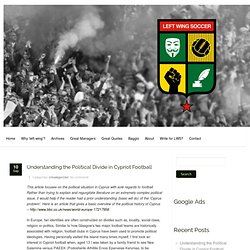
Rather than trying to explain and regurgitate literature on an extremely complex political issue, it would help if the reader had a prior understanding (basic will do) of the ‘Cyprus problem’. Here is an article that gives a basic overview of the political history of Cyprus – In Europe, fan identities are often constructed on divides such as, locality, social-class, religion or politics.
Similar to how Glasgow’s two major football teams are historically associated with religion, football clubs in Cyprus have been used to promote political ideologies. Having personally visited the island many times myself, I first took an interest in Cypriot football when, aged 13 I was taken by a family friend to see Nea Salamina versus PAEEK (Podosfairiki Athlitiki Enosi Eparxeias Kerynias, to be precise).
Omonoia fans displaying ‘Hammer and Sickle’ symbol. Written by Alex Leigh @AlexGLeigh. The Politics of 'Futbol' Duncan Shaw looks at how the entry of Spain into the EEC in 1985 furthered its process of integration into the European community.
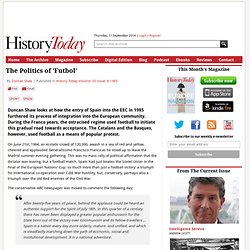
During the Franco years, the ostracised regime used football to initiate this gradual road towards acceptance. The Catalans and the Basques, however, used football as a means of popular protest. On June 21st, 1964, an ecstatic crowd of 120,000, awash in a sea of red and yellow, cheered and applauded Generalissimo Francisco Franco as he stood up to leave the Madrid summer evening gathering.
This was no mass rally of political affirmation that the dictator was leaving, but a football match. Spain had just beaten the Soviet Union in the Final of the European Nations' Cup; so much more than just a football victory: a triumph for international co-operation over Cold War hostility, but, conversely, perhaps also a triumph over the old Red enemies of the Civil War.
Politics and club identity: FC Barcelona and Real Madrid. Barca to wear Senyera against Bilbao. Barcelona will wear their Senyera shirt when they take on Athletic Bilbao at the Camp Nou on Saturday afternoon.
